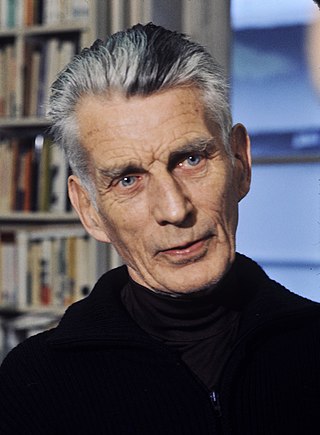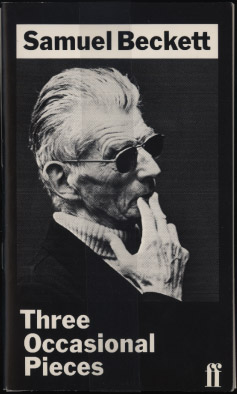
Samuel Barclay Beckett was an Irish novelist, dramatist, short story writer, theatre director, poet, and literary translator. His literary and theatrical work features bleak, impersonal, and tragicomic experiences of life, often coupled with black comedy and nonsense. His work became increasingly minimalist as his career progressed, involving more aesthetic and linguistic experimentation, with techniques of stream of consciousness repetition and self-reference. He is considered one of the last modernist writers, and one of the key figures in what Martin Esslin called the Theatre of the Absurd.

Waiting for Godot is a play by Irish playwright Samuel Beckett in which two characters, Vladimir (Didi) and Estragon (Gogo), engage in a variety of discussions and encounters while awaiting the titular Godot, who never arrives. Waiting for Godot is Beckett's reworking of his own original French-language play, En attendant Godot, and is subtitled "a tragicomedy in two acts".
Act Without Words I is a short play by Samuel Beckett. It is a mime, Beckett's first. Like many of Beckett's works, the play was originally written in French, being translated into English by Beckett himself. It was written in 1956 following a request from the dancer Deryk Mendel and first performed on 3 April 1957 at the Royal Court Theatre in London. On that occasion it followed a performance of Endgame. The original music to accompany the performance was written by composer John S. Beckett, Samuel's cousin, who would later collaborate with him on the radio play Words and Music.
This article contains information about the literary events and publications of 1983.

Come and Go is a short play by Samuel Beckett. It was written in English in January 1965 and first performed at the Schillertheater, Berlin on 14 January 1966. Its English language premiere was at the Peacock Theatre, Dublin on 28 February 1968, and its British premiere was at the Royal Festival Hall in London on 9 December 1968. It was written for and dedicated to the publisher John Calder.

Krapp's Last Tape is a 1958 one-act play, in English, by Samuel Beckett. With a cast of one man, it was written for Northern Irish actor Patrick Magee and first titled "Magee monologue". It was inspired by Beckett's experience of listening to Magee reading extracts from Molloy and From an Abandoned Work on the BBC Third Programme in December 1957.
Endgame is an absurdist, tragicomic one-act play by Irish playwright Samuel Beckett. It is about a blind, paralyzed, domineering elderly man, his geriatric parents, and his servile companion in an abandoned house in a post-apocalyptic wasteland, who await an unspecified "end". Much of the play's content consists of terse, back and forth dialogue between the characters reminiscent of bantering, along with trivial stage actions; the plot is supplanted by the development of a grotesque story-within-a-story that the character Hamm is relating. The play's title refers to chess and frames the characters as acting out a losing battle with each other or their fate.
Westward Ho may refer to:
How It Is is a novel by Samuel Beckett first published in French as Comment c'est by Les Editions de Minuit in 1961. The Grove Press published Beckett's English translation in 1964. An advance text of his English translation of the third part appeared in the 1962 issue of the Australian literary journal, Arna.
What Where is Samuel Beckett's last play produced following a request for a new work for the 1983 Autumn Festival in Graz, Austria. It was written between February and March 1983 initially in French as Quoi où and translated by Beckett himself.

A Piece of Monologue is a fifteen-minute play by Samuel Beckett. Written between 2 October 1977 and 28 April 1979 it followed a request for a “play about death” by the actor David Warrilow who starred in the premiere in the Annex at La MaMa Experimental Theatre Club, New York on 14 December 1979.

Company is a novella by Samuel Beckett, written in English and published by Calder Publishing in 1979. It was translated into French by the author and published by Les Éditions de Minuit in 1980. Company was Beckett's first work of prose in over 30 years that was originally written in English.

The Fizzles are eight short prose pieces written by Samuel Beckett:
Samuel Beckett wrote the radio play, Words and Music between November and December 1961. It was recorded and broadcast on the BBC Third Programme on 13 November 1962. Patrick Magee played Words and Felix Felton, Croak. Music was composed especially by John S. Beckett. The play first appeared in print in Evergreen Review 6.27. Beckett himself translated the work into French under the title Paroles et Musique.
Nohow on is a collection of three prose pieces by Samuel Beckett, comprising Company, Ill Seen Ill Said, and Worstward Ho. It was first published in one volume in 1989.
Ill Seen Ill Said is a novella by Samuel Beckett. It was first published in French as Mal vu mal dit in 1981, and was then translated into English by the author in 1982. It was also published in the October 5, 1981 edition of The New Yorker.
Rough for Radio I is a short radio play by Samuel Beckett, written in French in 1961 and first published in Minuit 5 in September 1973 as Esquisse radiophonique. Its first English publication as Sketch for Radio Play was in Stereo Headphones 7. It first appeared under its current title in Ends and Odds.
Rough for Radio II is a radio play by Samuel Beckett. It was written in French in 1961 as Pochade radiophonique and published in Minuit 16, November 1975. Beckett translated the work into English shortly before its broadcast on BBC Radio 3 on 13 April 1976. Martin Esslin directed Harold Pinter, Billie Whitelaw (Stenographer) and Patrick Magee (Fox). The English-language version was first published in Ends and Odds as Radio II.
The Old Tune is a free translation of Robert Pinget’s 1960 play La Manivelle in which Samuel Beckett transformed Pinget's Parisians, Toupin and Pommard into Dubliners, Cream and Gorman. Its first radio broadcast was by the BBC Third Programme on 23 August 1960, directed by Barbara Bray with Jack MacGowran as Cream and Patrick Magee as Gorman.

"The Capital of the Ruins" is a short piece of reportage by Samuel Beckett written in 1946.








